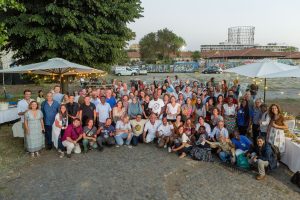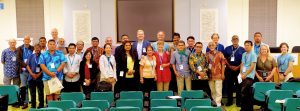Non-governmental organizations, civil society organizations and government representatives need to work collectively to advance the agendas of small-scale fisheries and fisher communities
This article is by Elena M. Finkbeiner (efinkbeiner@conservation.org), Director of Coastal Community Fisheries, Center for Oceans, Conservation International and Associate Professor of Practice, Coastal Science and Policy, University of California Santa Cruz, California, USA
For as long as I can remember I have been absolutely in awe of the struggle, resistance, resilience and triumph of fishing communities and their inseparable knowledge of, and relationship with, their marine environment. However, there was a distinct turning point in my personal and professional life when I met Hector, a fisherman from a small coastal town in the Gulf of California, Mexico. Hector and I spent hours together on his small fibreglass vessel, hauling in nets from the dark early morning hours until the blazing midday sun was so unbearable even our tepid coffee from the thermos felt refreshing and cool.
Through his stories and his friendship, my heart and mind were split wide open to the realities of being a fisher and the countless challenges he endured, matched by an unwavering desire to steward the life force that sustained him. I forged my life and career based on this intimate understanding that Hector shared with me through his words and practice. I feel so grateful to have had the opportunity to learn from, and establish relationships with, small-scale fishers, fishworkers and communities from around the world for the greater part of my adult life.
… it was heartening to see a special session dedicated to the tenth anniversary of the SSF Guidelines…
Now, I represent an international environmental non-governmental organization (NGO) as the director of the Coastal Community Fisheries programme. I cherish this position and honour due to the incredible people I get to work with day in and day out, both our amazing staff and our community partners. And this is also a position I occupy with great care, caution and humility due to our collective knowledge and recognition that the conservation movement has not always respected the rights and well-being of indigenous peoples, local communities, and small-scale fishing actors. However, this is exactly why I have consciously decided to become a part of this movement; we have the opportunity and responsibility to turn this around.
It was in this capacity that I was fortunate enough to attend the second Small-scale Fisheries (SSF) Summit, ahead of the 36th Session of the Committee on Fisheries (COFI) of the Food and Agriculture Organization of the United Nations (FAO) in Rome in July 2024. Walking through the grand entrance of the FAO building to the Summit meeting room, I was struck by a sense of optimism and hope. The Summit would be held at the FAO building for the first time in advance of the 36th Session of COFI. Not only was the venue official, but small-scale fisheries would be featured on the agenda of the formal COFI session.

I spent the next several days learning from, and engaging in, interesting conversations with fishers and fishworkers, funders, academics, government officials and NGO actors. The topics included the importance of secure tenure and access for small-scale fisherfolk and the right to decent work and social protection in the fishing sector. Following the Summit, during COFI, it was heartening to see a special session dedicated to the tenth anniversary of the SSF Guidelines and to hear countless interventions from delegates around the world calling for greater recognition of SSF and the critical role of indigenous peoples, local communities, women and youth. It feels as though we are finally gaining momentum in global dialogues. I sincerely hope this continues to move forward.
Despite the optimism, I recognized that we still have a long way to go to build trust and relationships, and to mend past harms as we strive for a successful global small-scale fisheries movement. I believe this must begin with the full accountability and responsibility on behalf of conservation NGOs.
… we must unlearn conceptions of sustainability and conservation that threaten the rights of SSF.
To echo some of the critical comments we heard from SSF representatives, conservation must not come at the expense of the rights of fishing communities; the criminalization of SSF must not happen under the guise of conservation; and we must unlearn conceptions of sustainability and conservation that threaten the rights of SSF. This is a role and responsibility we can, and must, take first by advocating for change within our own respective organizations.
Trust cannot be built between conservationists and SSF actors through an event held every other year. This type of trust requires a real commitment to engage and follow through, repeated interactions, and it also requires time. This trust will be built through informal conversations over coffee or lunch or through connecting over smartphones, but not by listening to presentations. While the SSF Summit offers us an important occasion to meet every two years, we need to find additional opportunities to keep the conversation going and work towards a collaboratively defined partnership based on commonly shared values and commitments to respectful engagement.
Given this, the SSF Summit itself can be redesigned to support greater trust building and engagement both at the meeting itself and beyond. First, the Summit can reserve more time for informal interactions through free time, field trips, group meals or other activities. Perhaps these activities could be thoughtfully and intentionally designed so that people who do not normally feel comfortable in interactions can get to know one another.

Second, the Summit can spend less time on presentations and reallocate more time for smaller break-out groups to workshop certain issues and ideas. The last SSF Summit offered space for smaller groups to discuss tenure rights and social development issues but there was not sufficient time to get to concrete next steps, action items, or ideas for how to advance this work collectively before the next Summit.
Third, perhaps participants can organize into working groups around specific themes or issues of interest, for example, advocating for secure tenure. Or regional working groups that transcend institutions, for example, a West African working group with NGOs, civil society organizations and government representatives to advance certain issues or geographic priorities before the subsequent Summit. In this way we could have more continuous and fluid engagement without losing momentum.
In closing, please know that the SSF movements have allies in conservation NGOs. We take your Call to Action and Rules of Conduct to heart. We will always respect and never undermine your rights, realizing that there is nothing about you without you and the right to your own voice, and that working with you also means funding you.
We are open and willing to hear your feedback, learn from you, improve our practice and way of working, and find ways by which we can work collectively to advance the agendas of small-scale fishers, fishworkers and communities. But we cannot wait for the next SSF Summit to do this. We need to start this important work now, so that when we come together for the next meeting in Rome, we are ready to roll up our sleeves and dig in together. So that the SSF movement’s voice is heard loud and clear on an international stage like never before.
For more
Center for Oceans
https://www.conservation.org/about/center-for-oceans
Alienated Marginalized
https://icsf.net/samudra/alienated-marginalized/
Critical interventions
https://icsf.net/yemaya/critical-interventions/